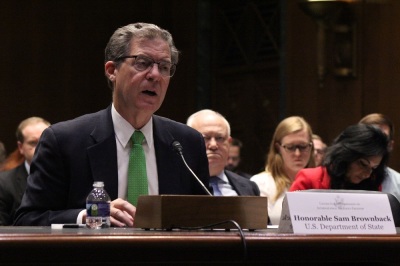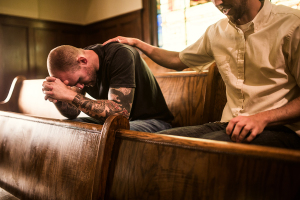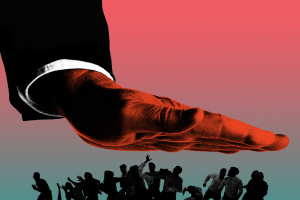New report on Christian persecution highlights global trends that threaten religious freedom

The 2020 World Watch List highlights the severe persecution faced by more than 260 million Christians in 50 countries around the world and points to trends of religious repression that affect not only Christians but those of any faith who have their religious freedom threatened at the hands of tyrants or terrorists.
The World Watch List is released annually by Open Doors, an organization working with persecuted Christians for more than 60 years. The World Watch List is important as a reliable source of information that demonstrates the global scale of the problem. The list draws from on-the-ground reporting that is cross-checked with research organizations and experts on religious freedom and Christian persecution.
This list is particularly useful because it measures not only violent persecution, but also pressure on Christians in their individual, family, community, church, and national life — these other domains where religious freedom is so often violated.
North Korea tops the list again for the 18th time, a fact not surprising given the way in which the regime seeks to control all parts of life.
This List provides important insights into not only particular countries but also some of the major trends that threaten religious freedom around the globe.
Technology-aided surveillance state: China
China (#23) has laid out a blueprint for government repression of religion through their use of emerging technology and artificial intelligence (AI) to bolster its state surveillance programs.
In efforts tantamount to a second cultural revolution, the Chinese Communist Party is deploying these tools to close down churches and to enforce an ideology of “government as god.”
If we want to see where this trend may be heading for Christians, we need only to look at the Uyghur Muslim community where more than 1 million have been detained in “re-education camps” because of their religious beliefs, which China labels a security threat in its war on faith.
The situation is alarming enough in China and we are seeing this technology exported and poised to be a devastating tool for other authoritarian regimes.
Religious Institutions Under Assault
One of the most shocking statistics from the Open Doors World Watch List 2020 is that more than 9,400 churches and Christian institutions were attacked.
This trend was driven by a major uptick in violence across the Sahel region of west and central Africa. Eritreia (#6), Nigeria (#12), Central African Republic (#25), Burkina Faso (#28), and Mali (#29) have all witnessed high levels of violence.
The assault on houses of worship have spanned the globe and hit not just churches such as the Easter bombing of churches across Sri Lanka, but mosques, and synagogues. Addressing these attacks on houses of worship was a major feature for President Trump at the United Nations General Assembly in New York.
Minorities Under Threat Amidst Instability in the Middle East
In Iraq, Christians and Yazidis remain on the brink of extinction. Continued violence from terrorist groups like ISIS and Iran-backed militias, who continue to sow havoc across the country creating instability that often impacts religious minorities.
Yet there are positive signs to be found in the protest movements continuing to fill the streets in Iraq, Lebanon, and even Iran who are rejecting the sectarian politics which are a major source of persecution and have been exploited by Iran for years. Following the recent uptick in US-Iran tensions, those protests have escalated, but whether they will succeed remains to be seen.
Opportunity for a U.S.-led multifaceted response
With the global scale of threats to religious freedom, a global, multifaceted response that includes both governments and civil society is urgently needed.
Behind the efforts of Ambassador at Large for International Religious Freedom Sam Brownback and a handful of others at the State Department, the U.S. has been leading a movement of governments focusing on the issue, but more officials need to recognize this as a central foreign policy priority.
As Assistant Secretary of State for Democracy Human Rights and Labor, Robert Destro, said at the release of the World Watch List, the issue of religious freedom is a component of nearly every issue that crosses his desk.
As an example for how religious freedom can inform other elements of policy, consider the recently signed phase one of a major trade agreement between the United States and China. Tangible progress on religious freedom and other rights issues should be a part of the implementation of that deal and any future negotiations. The U.S. government should push this diplomatically and American businesses working in China should use their influence to show how religious freedom is good for business and not provide tools for oppression.
The US government — beginning with the president — can still further elevate religious freedom as an explicit foreign policy priority that impacts diplomacy, security, and, in particular, humanitarian and international development assistance.
USAID Administrator Mark Green and Vice President Pence have done this in an ad hoc way with assistance to religious minorities in Iraq who have survived genocide, but that was not without its challenges.
Promoting religious freedom and addressing a problem of the scale shown in the World Watch List should be a core priority of U.S. foreign assistance. To do this effectively will require increased resources and also more effective implementation methods and evaluation indicators to better protect vulnerable individuals and communities in conflict and crises.
The challenges are clear, now the United States, and others, should take steps to further elevate religious freedom in policy and practice, at home and around the world, to address these problems.
Jeremy P. Barker is Senior Program Officer and Director of the Middle East Action Team of the Religious Freedom Institute. The Religious Freedom Institute (RFI) works to secure religious freedom for everyone, everywhere. RFI is a non-profit, non-partisan organization based in Washington, D.C.



























